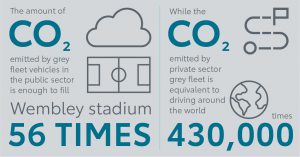7th August 2020
Grey Fleet Management Guide

Throughout the Covid-19 pandemic, the UK fleet industry has played a pivotal role in helping to sustain the vital organs of our economy and society.
By delivering PPE to our hospitals, groceries to our supermarkets, prescriptions to our loved ones; as well as transporting NHS staff to their patients and ensuring key workers get to their place of work, the fleet industry has been actively supporting our communities since the very start of the coronavirus outbreak.
As UK businesses re-open and more drivers return to the road, there will be an increase in employees using their private vehicles for business travel as working practices shift and until confidence in public transport returns, people will prefer to undertake journeys in their own, personal space.
This increased number of grey fleet vehicles is just one of the challenges set to face fleet managers as a consequence of Covid-19 and employers will need to start thinking about how this imminent increase will impact their operations and what changes they need to consider in order to manage their grey fleet drivers safely and efficiently.
 What is a Grey Fleet?
What is a Grey Fleet?
‘Grey fleet‘ is the term used to describe any vehicles that do not belong to the company, but which are used by employees for business travel. This might include a vehicle purchased via an employee ownership scheme, a privately rented vehicle or a vehicle privately owned by an employee. Cash allowance schemes extensively used in the private sector are also considered grey fleet.
Below, we explain the challenges grey fleet drivers present to employers and offer solutions to help businesses control the costs, environmental impact and duty of care obligations associated with employees using their own vehicles in the course of their work.
Health & Safety

Managing your fleet to ensure you meet your legal duties has become an increasingly complex business.
The Health and Safety at Work etc Act 1974 requires employers to ensure, so far as is reasonably practicable, the health and safety of all employees while at work. Employers and employees also have a responsibility to ensure that others are not put at risk during any work-related driving activities, irrespective of the ownership of the vehicle.
In practice, this means employers have the same legal duty of care for grey fleet drivers as they would for those in a work supplied vehicle.
Grey fleet already makes up a sizeable proportion of the UK’s business transportation but frequently businesses have little visibility or control over the cost and significant risks. There are few other areas in any business which carry such a high tariff for failure – such as the potential for Corporate Manslaughter – yet are often without the formal processes required to mitigate this risk.

Current health and safety regulations stipulate that organisations need robust policies in place to ensure that every grey fleet car is fit for purpose, has valid Road Tax and MOT, is insured for appropriate business use and that the employee has a valid driving licence.
If a grey fleet driver is out on business using their own car, your business could be liable if an accident were to occur. If your company does not have a robust Work Related Road Risk process in place, some of your employees could be driving for work illegally and therefore be more at risk, both to themselves and to other road users.
As more employees continue to work from home even after the reopening of businesses, if the place of work clause in an employee contract subsequently changes to home working, this will mean that any travel to the office – previously classed as commuting – would become designated as business travel.
So, this will mean that organisations will have the same legal duty of care for these employees as they would for those in a work supplied vehicle and will need to have processes in place to manage aspects such as driver licence checking, insurance validity, vehicle condition and mileage audit.
Ensuring your organisation holds details for all those who drive for work is essential, including all members of your grey fleet. This is where a professional grey fleet management partner can prove invaluable, saving you both time and hassle by providing a comprehensive driver risk management solution to record and monitor your grey fleet driver population – giving you peace of mind that your duty of care has been fulfilled.
Environmental

As we recover from Covid-19, fleets will need to adapt to new ways of doing business, with more remote working and a major focus on efficiency.
During lockdown, companies have learned a lot, especially that they can still do a lot of things they used to be able to do without necessarily being face to face which will mean less travel; presenting many organisations with the opportunity to cut carbon emissions and help tackle the UK’s air quality crisis.
Many former office-based workers will now be re-classified as homeworkers and subsequently will be driving in their own vehicles on company business.
Research shows that grey fleet vehicles are typically older than company-owned vehicles with higher CO2 emissions. Therefore, if poorly managed, an organisation’s grey fleet can easily erode any progress made by the organisation to reduce its carbon footprint, and damage the Government’s efforts to reduce the nation’s air pollution.
Fortunately, the fleet industry has responded to the challenge of enabling more cost effective and cleaner business travel by developing a range of innovative products and services that can help organisations tackle grey fleet. These products include driver risk management systems, lease vehicles, daily rental, and salary sacrifice schemes. These solutions can be used in a variety of different combinations to suit the requirements of organisations and drivers.
The increase in home working post Covid-19 will lead to reduced mileages and potentially make electric vehicles viable for more fleets.
With drivers less inclined to travel, and more inclined to want to retain the cleaner air witnessed in our cities during the lockdown, there is now a real opportunity to embrace the use of electric vehicles as a viable option.
![]()
Although electric vehicles may not have been a good fit for some businesses before, taking into account the significant air pollution reductions achieved across the country during lockdown together with the reduced business mileage as businesses adapt to the new “normal”, now is the perfect time for fleet managers to review their EV policy.
By choosing to implement a salary sacrifice car scheme, organisations can provide their employees with the opportunity to drive well maintained and modern vehicles, complete with the latest technology, low emissions and high fuel efficiency. As well as improving compliance with Health & Safety and Duty of Care legislation, this can also help to improve an organisation’s green credentials.
And by opting for a car with the lowest possible CO2 emissions, employees can, themselves, benefit from greater savings since the Benefit-in-Kind (BiK) rates for all-electric cars have now been reduced from 16% to 0%. By switching to an electric vehicle, they will also be exempt from Congestion Zone and Clean Air Zone charges.
Financial

Before the pandemic, the Department for Transport (DfT) estimated that an organisation with 500 grey fleet drivers covering an average 1,000 miles per year in their own vehicles would have been spending approximately £225,000 per year in mileage reimbursements alone.
And now, with the imminent increase in grey fleet drivers across the UK, cost efficiency will become even more important to organisations in both the private and public sectors.
Grey fleet mileage is typically reimbursed using AMAP rates. Some organisations, particularly in the public sector, even pay above AMAP rates. Doing so significantly increases the amount spent on employee travel and also has Class 1A National Insurance contribution implications.
Taking this into account, it is clear that an increase in total grey fleet mileage could represent a major cost to organisations who are already under pressure to cut costs. And if there is a lack of control over mileage expense claims, inaccuracy will only add to this cost.
While grey fleet expenditure will be necessary to enable businesses to recover as we emerge from the Covid-induced crisis, if managed properly there are real opportunities to reduce costs without affecting business performance.
How to reduce costs:
Mileage capture systems
By implementing professional mileage capture systems which are easily accessible to employees via mobile devices, organisations can enable their grey fleet drivers to easily submit business mileage on a regular basis to improve the accuracy of employee travel data.
Implement a salary sacrifice scheme for cars
Salary sacrifice car schemes can generate financial savings for organisations by enabling their employees to drive newer, more efficient vehicles which will reduce their business mileage reimbursement costs.
By implementing a salary sacrifice scheme for cars, organisations will also reduce the costs incurred by breakdowns and accidents, since their grey fleet drivers will be driving safer, well maintained vehicles.
Review fleet mix
With the emerging changes to business travel, fleet managers will need to closely monitor the need to travel and review the mix of their fleet vehicles to ensure that they select the most cost efficient solution: salary sacrifice car, company car, daily rental.
As we emerge from the Covid-19 crisis, UK businesses will be presented with an opportunity to take a more responsible, sustainable and cost-effective approach to their transport needs.
By managing their grey fleet effectively, organisations can meet duty of care responsibilities while at the same time making significant cost savings and minimising loss of productivity through staff absence, resulting from ‘at work’ road accidents. Additionally, they can enhance their corporate social responsibilities, through achieving a lower carbon footprint.

Speak with one of our fleet experts today to learn more about how KINTO can help you manage your grey fleet more effectively to minimise the risks to your business as we bounce back from the pandemic.
